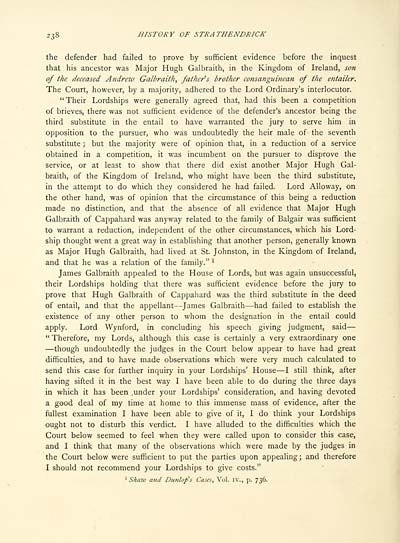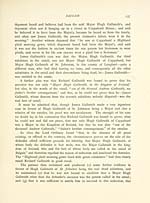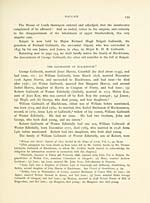Strathendrick, and its inhabitants from early times
(288) Page 238
Download files
Complete book:
Individual page:
Thumbnail gallery: Grid view | List view

238 HISTORY OF STRATHENDRICK
the defender had failed to prove by sufficient evidence before the inquest
that his ancestor was Major Hugh Galbraith, in the Kingdom of Ireland, son
of the deceased Andrew Galbraith, father's brother consanguinean of the entailer.
The Court, however, by a majority, adhered to the Lord Ordinary's interlocutor.
"Their Lordships were generally agreed that, had this been a competition
of brieves, there was not sufficient evidence of the defender's ancestor being the
third substitute in the entail to have warranted the jury to serve him in
opposition to the pursuer, who was undoubtedly the heir male of the seventh
substitute ; but the majority were of opinion that, in a reduction of a service
obtained in a competition, it was incumbent on the pursuer to disprove the
service, or at least to show that there did exist another Major Hugh Gal-
braith, of the Kingdom of Ireland, who might have been the third substitute,
in the attempt to do which they considered he had failed. Lord Alloway, on
the other hand, was of opinion that the circumstance of this being a reduction
made no distinction, and that the absence of all evidence that Major Hugh
Galbraith of Cappahard was anyway related to the family of Balgair was sufficient
to warrant a reduction, independent of the other circumstances, which his Lord-
ship thought went a great way in establishing that another person, generally known
as Major Hugh Galbraith, had lived at St. Johnston, in the Kingdom of Ireland,
and that he was a relation of the family." 1
James Galbraith appealed to the House of Lords, but was again unsuccessful,
their Lordships holding that there was sufficient evidence before the jury to
prove that Hugh Galbraith of Cappahard was the third substitute in the deed
of entail, and that the appellant — James Galbraith — had failed to establish the
existence of any other person to whom the designation in the entail could
apply. Lord Wynford, in concluding his speech giving judgment, said —
" Therefore, my Lords, although this case is certainly a very extraordinary one
— though undoubtedly the judges in the Court below appear to have had great
difficulties, and to have made observations which were very much calculated to
send this case for further inquiry in your Lordships' House — I still think, after
having sifted it in the best way I have been able to do during the three days
in which it has been .under your Lordships' consideration, and having devoted
a good deal of my time at home to this immense mass of evidence, after the
fullest examination I have been able to give of it, I do think your Lordships
ought not to disturb this verdict. I have alluded to the difficulties which the
Court below seemed to feel when they were called upon to consider this case,
and I think that many of the observations which were made by the judges in
the Court below were sufficient to put the parties upon appealing; and therefore
I should not recommend your Lordships to give costs."
1 Shaw and Dunlofs Cases, Vol. IV., p. 736-
the defender had failed to prove by sufficient evidence before the inquest
that his ancestor was Major Hugh Galbraith, in the Kingdom of Ireland, son
of the deceased Andrew Galbraith, father's brother consanguinean of the entailer.
The Court, however, by a majority, adhered to the Lord Ordinary's interlocutor.
"Their Lordships were generally agreed that, had this been a competition
of brieves, there was not sufficient evidence of the defender's ancestor being the
third substitute in the entail to have warranted the jury to serve him in
opposition to the pursuer, who was undoubtedly the heir male of the seventh
substitute ; but the majority were of opinion that, in a reduction of a service
obtained in a competition, it was incumbent on the pursuer to disprove the
service, or at least to show that there did exist another Major Hugh Gal-
braith, of the Kingdom of Ireland, who might have been the third substitute,
in the attempt to do which they considered he had failed. Lord Alloway, on
the other hand, was of opinion that the circumstance of this being a reduction
made no distinction, and that the absence of all evidence that Major Hugh
Galbraith of Cappahard was anyway related to the family of Balgair was sufficient
to warrant a reduction, independent of the other circumstances, which his Lord-
ship thought went a great way in establishing that another person, generally known
as Major Hugh Galbraith, had lived at St. Johnston, in the Kingdom of Ireland,
and that he was a relation of the family." 1
James Galbraith appealed to the House of Lords, but was again unsuccessful,
their Lordships holding that there was sufficient evidence before the jury to
prove that Hugh Galbraith of Cappahard was the third substitute in the deed
of entail, and that the appellant — James Galbraith — had failed to establish the
existence of any other person to whom the designation in the entail could
apply. Lord Wynford, in concluding his speech giving judgment, said —
" Therefore, my Lords, although this case is certainly a very extraordinary one
— though undoubtedly the judges in the Court below appear to have had great
difficulties, and to have made observations which were very much calculated to
send this case for further inquiry in your Lordships' House — I still think, after
having sifted it in the best way I have been able to do during the three days
in which it has been .under your Lordships' consideration, and having devoted
a good deal of my time at home to this immense mass of evidence, after the
fullest examination I have been able to give of it, I do think your Lordships
ought not to disturb this verdict. I have alluded to the difficulties which the
Court below seemed to feel when they were called upon to consider this case,
and I think that many of the observations which were made by the judges in
the Court below were sufficient to put the parties upon appealing; and therefore
I should not recommend your Lordships to give costs."
1 Shaw and Dunlofs Cases, Vol. IV., p. 736-
Set display mode to:
![]() Universal Viewer |
Universal Viewer | ![]() Mirador |
Large image | Transcription
Mirador |
Large image | Transcription
Images and transcriptions on this page, including medium image downloads, may be used under the Creative Commons Attribution 4.0 International Licence unless otherwise stated. ![]()
| Histories of Scottish families > Strathendrick, and its inhabitants from early times > (288) Page 238 |
|---|
| Permanent URL | https://digital.nls.uk/95338987 |
|---|
| Description | A selection of almost 400 printed items relating to the history of Scottish families, mostly dating from the 19th and early 20th centuries. Includes memoirs, genealogies and clan histories, with a few produced by emigrant families. The earliest family history goes back to AD 916. |
|---|

